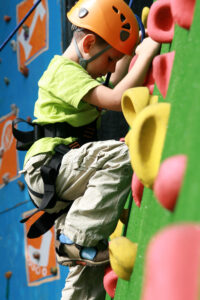The Importance of Choosing Traditional and Non-Traditional Electives for Your Homeschooled Student
Electives That Work for Pre-School Through Grade 4 Students



Homeschooling has gained popularity in recent years, offering families the flexibility to tailor education to their child’s unique needs and interests. One of the greatest advantages of homeschooling is the ability to choose electives that go beyond the typical curriculum, allowing students to explore and excel in various subjects. In this article, we will delve into the significance of selecting both traditional and non-traditional electives for middle school and high school homeschoolers, highlighting the benefits they offer in shaping well-rounded, curious, and engaged learners.
The Power of Electives in Homeschooling
Electives play a vital role in a homeschooling curriculum, enriching the educational experience and nurturing a student’s passion and talents. By choosing electives thoughtfully, parents can provide their child with an opportunity to explore diverse subjects, expand their horizons, and potentially discover new interests that can influence their academic and career choices in the future.
Traditional Electives for Elementary School Homeschoolers:
1. Art and Crafts: Engaging in art and crafts activities helps young learners express their creativity and develop fine motor skills.
2. Music Appreciation: Introducing children to various musical styles and instruments fosters a love for music and rhythm.
3. Physical Education (PE): Incorporating age-appropriate physical activities, games, and exercises promotes physical health and coordination.
4. Foreign Language Introduction: Early exposure to foreign languages can make learning new languages easier and enhance cultural awareness.
5. Nature Studies: Exploring the natural world through outdoor activities and nature walks encourages a deeper appreciation for the environment.
6. Basic Cooking: Involving children in simple cooking tasks instills a sense of responsibility and introduces them to basic kitchen skills.
7. Introduction to Coding: Introducing coding concepts through games and puzzles helps young learners develop problem-solving skills.
8. Drama and Role Play: Encouraging dramatic play and role-playing boosts creativity and builds social skills.
9. Health and Hygiene: Teaching children about hygiene, healthy habits, and self-care promotes well-being and responsibility.
10. Storytelling and Creative Writing: Fostering a love for storytelling and creative writing helps develop language and communication skills.
Non-Traditional Electives for Elementary School Homeschoolers:
1. Yoga and Mindfulness: Introducing yoga and mindfulness exercises helps children manage stress and build emotional resilience.
2. Animal Studies: Learning about different animals, their habitats, and their characteristics instills a sense of curiosity and empathy.
3. Science Experiments: Conducting simple science experiments at home encourages a love for science and exploration.
4. Gardening and Plant Care: Allowing children to care for plants and grow their own vegetables teaches responsibility and environmental awareness.
5. Outdoor Adventure: Organizing nature hikes, camping trips, or scavenger hunts in nature enhances outdoor skills and appreciation for the natural world.
6. Financial Literacy: Introducing basic financial concepts, such as saving money and making simple budgets, lays a foundation for financial literacy.
7. Community Service: Involving children in age-appropriate community service projects instills empathy and a sense of social responsibility.
8. Archaeology and Paleontology: Delving into the study of ancient artifacts and fossils ignites curiosity about the past.
9. Digital Art and Animation: Exploring digital art and animation allows children to express their creativity using technology.
10. Science Fiction and Fantasy Exploration: Encouraging children to read science fiction and fantasy books opens their minds to imaginative storytelling and possibilities.
Remember, the best electives for elementary school homeschoolers are those that align with their interests and passions while encouraging curiosity and a love for learning. Tailor the elective choices to suit your child’s unique personality and learning style, fostering an enriching and enjoyable homeschooling experience.
Traditional Electives for Middle School Homeschoolers



1. Art and Design: Traditional art classes introduce students to various art forms, techniques, and art history that foster creativity and self-expression.
2. Music: Music classes can involve learning to play instruments, studying music theory, or exploring different genres, providing a well-rounded appreciation for music.
3. Foreign Language: Middle schoolers can benefit from learning a foreign language, opening doors to cultural understanding and improved cognitive abilities.
4. Physical Education: Physical education classes help students develop motor skills, teamwork, and overall fitness through sports, exercises, and outdoor activities.
5. Home Economics: Teaching practical life skills such as cooking, budgeting, and basic home maintenance prepares students for independent living.
6. Theater and Drama: Drama classes enhance communication, public speaking, and creativity, while allowing students to experience the joy of performance.
7. Health and Nutrition: Learning about health, nutrition, and personal wellness encourages healthy habits and responsible decision-making.
8. Computer Programming: Introducing programming languages to young learners can stimulate problem-solving skills and prepare them for an increasingly digital world.
9. Writing and Journalism: Engaging in writing workshops and journalism introduces students to effective communication and storytelling.
10. History and Social Studies: Exploring historical events, cultures, and societal structures enriches a student’s understanding of the world’s complexities.
Non-Traditional Electives for Middle School Homeschoolers
1. Photography: Teaching photography allows students to develop their artistic eye while capturing moments and telling visual stories.
2. Gardening and Horticulture: Gardening fosters a sense of responsibility and connects students with the environment.
3. Entrepreneurship: Introducing entrepreneurship concepts empowers students to think creatively and develop problem-solving skills.
4. Astronomy and Space Exploration: Studying the cosmos ignites curiosity and a sense of wonder about the universe.
5. Mindfulness and Meditation: Teaching mindfulness techniques can enhance emotional intelligence and mental well-being.
6. Robotics and Engineering: Exploring robotics introduces students to the principles of engineering and technology.
7. Creative Writing: Encouraging creative writing allows students to express themselves imaginatively and refine their literary skills.
8. Personal Finance: Teaching financial literacy equips students with essential money management skills.
9. Environmental Science: Studying environmental science raises awareness about environmental issues and sustainability.
10. Culinary Arts: Exploring the culinary arts lets students develop their cooking talents and culinary knowledge.
Exciting Electives for High School Students



Unlocking a World of Possibilities in High School Homeschooling
Homeschooling provides a unique opportunity to tailor your child’s education to their individual needs, interests, and strengths. As your high schooler embarks on their educational journey, the selection of electives can be a pivotal aspect of their development. Electives, both traditional and non-traditional, play a crucial role in shaping a well-rounded and intellectually curious individual. In this article, we’ll explore the significance of electives and provide a comprehensive list of 10 traditional and 10 non-traditional elective options for your homeschooled high school student.
The Power of Electives
Electives offer a chance for students to delve into subjects that ignite their passions, cultivate new skills, and broaden their horizons. Traditional subjects like mathematics, science, and language arts provide a strong foundation, but electives take learning to the next level. They promote critical thinking, creativity, and exploration, fostering a love for learning that extends far beyond the classroom.
Traditional Electives: A Tried and True Path
1. Art: Unleash your student’s creative expression through painting, drawing, sculpture, or digital art. Art not only enhances fine motor skills but also nurtures self-expression.
2. Music: Learning to play a musical instrument or exploring music theory can enhance cognitive skills, discipline, and a deep appreciation for the arts.
3. Foreign Language: Study a language beyond the core curriculum. A second language broadens cultural horizons and enhances cognitive abilities.
4. Physical Education (PE): Engage in regular physical activity to promote overall well-being, discipline, and teamwork.
5. Drama/Theater: Develop confidence, public speaking skills, and an understanding of the performing arts by participating in drama or theater classes.
6. Home Economics: Teach valuable life skills such as cooking, budgeting, and sewing, ensuring your student is prepared for independent living.
7. Computer Science: Delve into coding, programming, or web development, preparing your student for a tech-driven world.
8. Journalism: Hone writing skills while exploring the world of journalism, from news reporting to investigative writing.
9. Health and Nutrition: Learn about wellness, nutrition, and mental health to make informed life choices.
10. Physical Education (PE): Engage in regular physical activity to promote overall well-being, discipline, and teamwork.
Non-Traditional Electives: Expanding Horizons
1. Astronomy: Explore the cosmos, studying celestial bodies, stars, and the mysteries of the universe.
2. Environmental Science: Dive into ecological studies, environmental preservation, and sustainable living.
3. Psychology: Understand the human mind and behavior, fostering empathy and self-awareness.
4. Photography: Capture the world through the lens, honing both artistic and technical skills.
5. Creative Writing: Craft original stories, poems, and essays, nurturing imaginative thinking.
6. Film Studies: Analyze cinematic techniques, storytelling, and film history, enhancing media literacy.
7. Culinary Arts: Master the art of cooking, exploring diverse cuisines and culinary techniques.
8. Philosophy: Engage in profound discussions about ethics, knowledge, and the nature of reality.
9. Robotics: Dive into the world of engineering and automation, combining creativity and technology.
10. Personal Finance: Learn about budgeting, investing, and financial literacy, laying the groundwork for a secure financial future.
Customizing Your Student’s Journey
When choosing electives, consider your student’s strengths, interests, and future goals. Traditional electives provide a strong foundation, while non-traditional ones spark innovation and curiosity. The right balance ensures a holistic education that equips students with essential life skills and prepares them for a rapidly evolving world.
Benefits Beyond the Classroom
Electives offer more than academic growth. They instill a love for lifelong learning, boost self-esteem, and promote a well-rounded perspective. They also provide valuable content for college applications and help students stand out in a competitive landscape.
Encouraging Exploration
As your high schooler navigates the path of elective selection, encourage them to explore a blend of traditional and non-traditional subjects. The goal is to foster a growth mindset, curiosity, and a deep passion for learning.
In Conclusion
Choosing both traditional and non-traditional electives for your homeschooled high school student is an investment in their future. It opens doors to new experiences, nurtures talents, and prepares them for the diverse challenges of adulthood. As a parent, you have the privilege of tailoring their education to be as unique and inspiring as they are. Embrace the opportunity and watch your students thrive.
